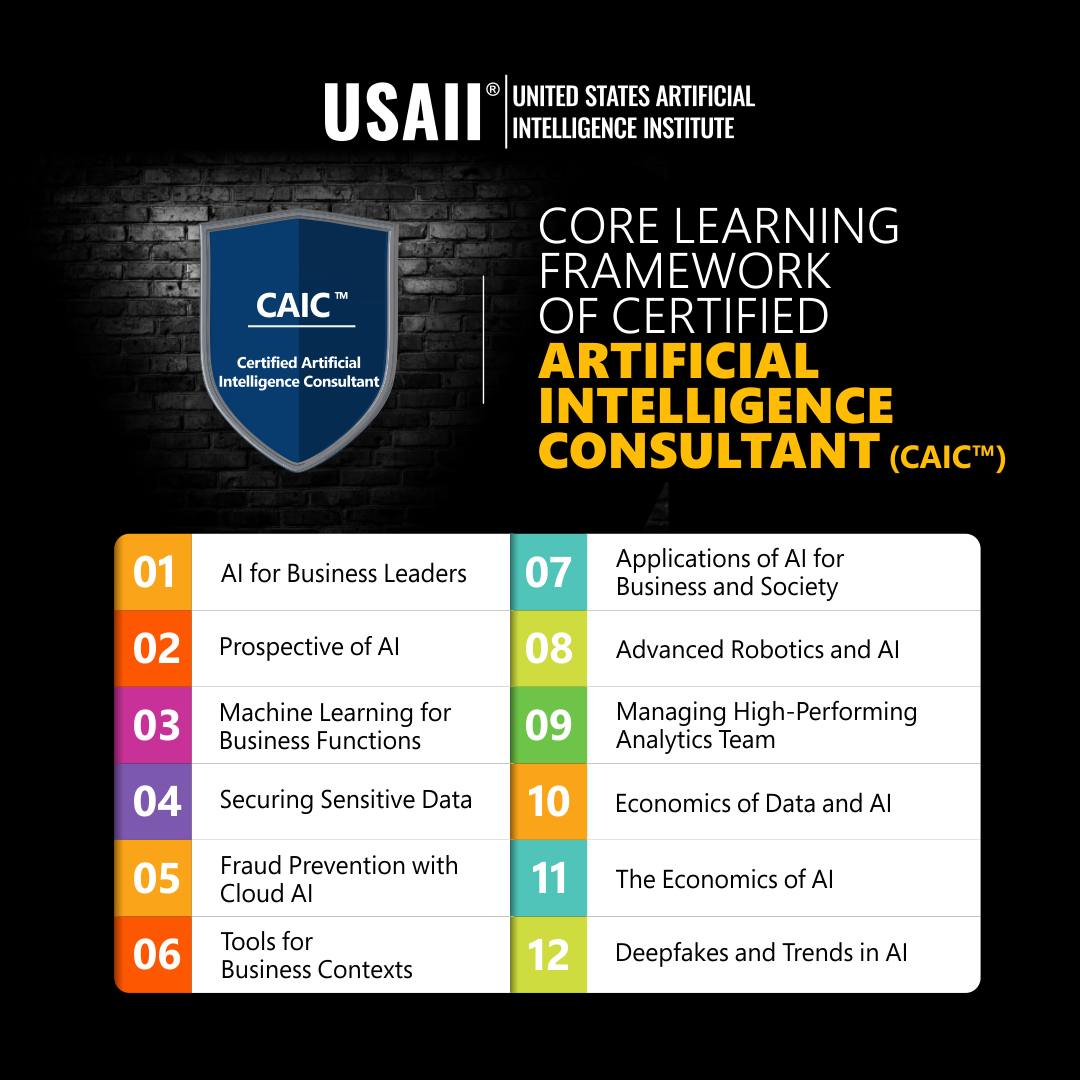The global market for AI consultants currently growing at a 39% rate yearly is projected to reach $630 billion by 2028. More than 50% of big companies are already leveraging AI consulting services (source: Forbes). The increasing adoption of these services is proof that becoming an AI consultant will be your right career choice. But what are the roles of AI consultants, how much they earn, and how could you get this job? Let’s find the answers to all these questions in this post, providing a complete roadmap to becoming a highly valued AI consultant.
What is an AI Consultant?
AI consultants are professionals who use their AI expertise and experience to recommend businesses on how they can implement AI into their operations to boost productivity, save costs, and generate higher revenue. This is counted among the highest salary brackets of AI. They are equipped with a working knowledge of multiple AI technologies, such as machine learning (ML) models, neural networks, computer vision, and deep learning.
What are the Roles and Responsibilities of AI Consultants in 2025?
- Examine the client’s current capabilities and plan what are the potential areas to apply AI.
- Closely work with business stakeholders to find AI use cases and look for new opportunities for better improvements.
- Develop the most effective and appropriate AI strategies and tools customized to the stakeholder’s requirements to solve numerous problems. They can also guide managers with the selection of the relevant AI platform from present toolsets.
- Work together with data scientists, ML engineers, and other experts to develop innovative and resourceful AI systems.
- Constantly evaluate the performance of an AI system and give essential tips.
- Guide business managers to use AI tools responsibly considering the ethical guidelines and regulatory needs.
Must-Have Qualifications and Skills for AI Consultants
- Educational degrees
Artificial intelligence consultant generally requires a bachelor’s degree in computer science, ML, data science, mathematics, AI, and other related fields. However, some companies prioritize candidates with an advanced or master’s degree. Considering a Ph.D. is beneficial to develop advanced knowledge and get ready for higher job roles. If you dream of getting a high-paying job, specialize in ML, NLP (natural language processing), and deep learning.
- Certifications

Certifications in data science, cloud computing, AI, and other fields can showcase your passion and proficiency in the respective field. AI consultant certification may also be required to work as an AI consultant based on the client’s needs and industry. Certifications, such as Certified Artificial Intelligence Consultant (CAIC™) from USAII® (United States Artificial Intelligence Institute) are specifically designed for candidates seeking AI and ML consultant roles.
- Skills
Professionals offering AI consulting services must have proficiency in ML algorithms, programming languages, data preprocessing, data visualization, AI tools, and data interpretation. Al consulting also demands some non-technical skills like good communication, critical thinking, problem-solving, project management, and adaptability.
How Much an AI Consultant Can Earn?
Just like other professions, the salary of AI consultants varies based on different factors, such as expertise level, skills, experience, location, and the industry. AI consultants received an average of $51.00 on an hourly basis (source: ZipRecruiter). According to Glassdoor, AI consultants are paid an average salary of $110,000 annually. A certified artificial intelligence consultant has a higher chance of getting a better-paying job. For example, USAII® certified experts have more possibilities to get up to a 50% raise in their salaries.
Most Useful Tips to Enter the Industry as an AI Consultant.
- Get the necessary qualifications as mentioned above based on your career goals and requirements.
- Acquire a relevant certification by choosing a trusted and widely recognized AI consultant course in 2025 to boost your expertise, skills, and credibility.
- Develop essential technical and non-technical skills to succeed in AI consulting.
- Acquire hands-on experience by working on personal AI projects/open-source projects or participating in internships. Practical experience is important to improve technical expertise and master the skills to implement AI solutions in business contexts.
- Collaborate with AI experts and data scientists or participate in data science and AI groups to develop or expand your professional network. You can leverage other online resources, such as social media, online forums, etc. to get information on the latest industry trends and requirements.
- Create your portfolio that highlights your AI projects, your technical skills, your contribution to a project, research papers, or successful implementations.
- Consider joining workshops, webinars, and conferences, and reading research papers or new publications to stay informed about the best practices and latest tools and advancements.
- If you are a beginner, apply for a job as a freelance consultant. However, if you have some knowledge, look for vacancies in consulting or tech organizations.
How Long Does It Take to Get the Job of AI Consultant?
The time taken to enter the market as an AI consultant depends on your career goals, current experience and skills, educational background, the sector you are choosing, and of course your dedication. If you are starting right from scratch, it will take around 4 years to get an essential degree and some practical experience. However, if you already have some knowledge and experience in AI-related jobs, you can start offering AI consulting services in a few weeks after taking the appropriate certification.
Conclusion
So now that you know what education, skills, and experience you require to be an AI consultant, it’s time to start putting in your best efforts and get this dream job. By developing essential skills, knowledge, and tools, you can separate yourself from the crowd and succeed in the AI world. Remember, constant learning and adaptation are important for career advancement. So, engage in continuous learning to prepare for higher roles.


